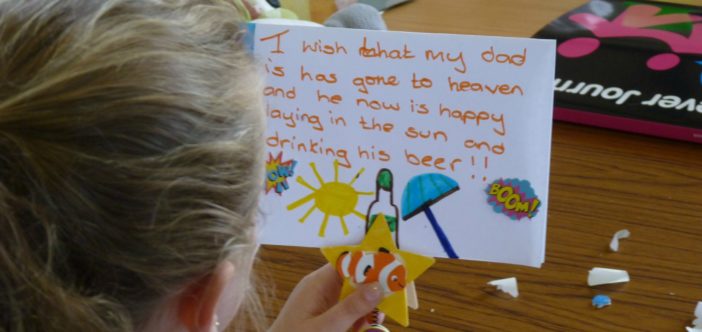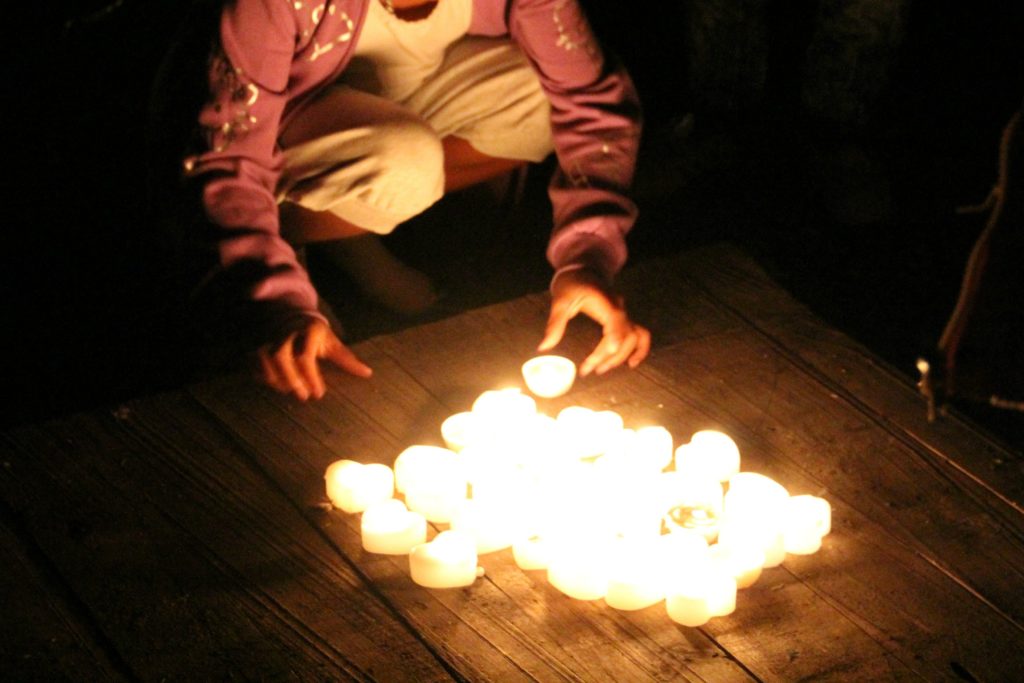How can we help children to understand and talk about grief?

We all experience death, dying and grief differently. When a loved one dies, children may find it particularly difficult to express themselves and understand what has happened.
Here, Stacey Hart from child bereavement charity Grief Encounter explains how children understand death and what can be done to help them find light and meaning in grief.
What is Grief Encounter?
At Grief Encounter, we support children and young people through bereavement to alleviate the pain caused by the death of someone close. Rebuilding a new life after the death of a loved one is hard, especially for children; they have an overwhelming sense of confusion, fear and anxiety alongside their grief.
We estimate that in 2015, 23,600 parents died in the UK leaving dependent children. That’s one parent every 22 minutes, and 112 newly bereaved children every day.Stacey Hart, Grief Encounter
A child’s parent or sibling dying will essentially mean the death of somebody young who hasn’t lived a full, long life:
- How can a child accept the fact that Mum died suddenly when they were 12?
- Can a child ever accept at 22 that their father will never meet their fiancé or kiss their children goodnight?
No one knows exactly how many children are bereaved each year. Data is collected annually on the number of children affected by the divorce of their parents, but not on the number affected by the death of a parent. We estimate that in 2015, 23,600 parents died in the UK leaving dependent children. That’s one parent every 22 minutes, and 112 newly bereaved children every day.
How children understand death
Children and adults understand death in very different ways. As children grow and mature, their earlier ways of thinking about death will change, too. It is essential for adults to have a sense of how children conceptualise death at different ages, so that when the time comes to talk about it they can respond in an appropriate way for the child’s developmental age.
The age groups below are not intended to be exact, but rather representative of the differing developmental stages. As a child gets older and their perception of death changes, understanding these stages is crucial to giving children and young people the right kind of support.
0-2 years old
Up to the age of two, a child will have little to no understanding of death, although they can perceive emotions such as the grief of people around them. From two onwards, children start to grasp the concept of a person dying, even though to begin with they don’t understand its permanency.
2-5 years old
Children aged 2-5 can vary enormously in their understanding of the world and death. Most likely they will know the words ‘death’ and ‘dying’ but will probably still not have a real understanding of its permanence. They might imagine the dead person can return or that they are in an actual physical place, like heaven. Generally, there is no concept of a personal death; death is something that only happens to other people. They may start to express concerns that significant adults will also die.
5+ years old
As children get older, they begin to grasp the finality of death and may develop an increased interest in the physical and biological aspects of death. But this increased factual understanding of death is often mixed with fantasies such as a preoccupation with skeletons and ghosts. “Magical thinking”, believing that thoughts can make things happen – like accidents and death – can be confusing and frightening at this time.
Teenagers
Teenagers will most likely be characteristically unpredictable and volatile in their responses to hearing that a loved one has died. Some may want to be close to family, ignoring school and social lives. Others may distance themselves in a way that can feel hurtful and rejecting. Their peer group can be very important and ‘acting out’ behaviours can be worrying for caregivers. It is important to give young people space to process their changing emotions whilst trying to maintain the usual boundaries and rules that will help them to feel safe at such a confusing time.
Being honest with children in an age-appropriate way is generally the best approach, as vagueness can lead to fears that something worse is being hidden from them. It’s also important for children to witness people grieving and displaying their emotions. Showing that it’s OK to cry is good for children, otherwise they hold in their feelings. For example, if Dad has died and they see Mum keeping a stiff upper lip, they might think they have to as well, believing that it’s not OK to show your feelings.
Deborah’s story
Deborah was 35 her husband John died at just 34 years old. They have three children together: Josie, 11; Harry, 8; and Darcy, 3.
John was a doctor. One day in April 2017, he collapsed unexpectedly at the gym. He was in a coma for a week before he died in hospital. Deborah was on maternity leave at the time from her job as a graphic designer.
To say our lives have been turned upside down, inside out and scrunched up is an understatement. But as a family, I want to show the children that there is still a life to be had, and that John is very much at the heart of our family.Deborah
The day John died, Deborah had been wondering where he was; she was unable to reach him and he was late to return home. When the hospital called her mobile, she was out shopping with the children. At first, she had no idea what had happened and the hospital wouldn’t explain over the phone. She hurried there to find him in a coma.
The family has been working with Grief Encounter since 2017, attending group workshops, receiving counselling and enjoying fun days. They feel that this support has been invaluable. The children feel less alone whilst trying to adjust to life without John. Everyone has space to reflect on how they feel and to share and hold on to their memories. Deborah explained:
“To say our lives have been turned upside down, inside out and scrunched up is an understatement. But as a family, I want to show the children that there is still a life to be had, and that John is very much at the heart of our family. Grief Encounter has helped and is helping us all to do that.”
From acceptance to adjustment
The word ‘acceptance’ is frequently used to define the last stage of grief. It is often believed that this is where we are supposed to get to after we have experienced the many different emotions on our grief journey. We must manage expectations. Of course, we need a positive outcome for our children and young people. So we change the word ‘acceptance’ to ‘adjustment’. This way, we can acknowledge that life will never be the same, that there will be lots of changes and new normals. The term ‘adjusted’ should alleviate the pressure for the bereaved. It’s OK to feel angry, sad, guilty and know that this is perfectly normal.
Helping children to find light in grief
What positives are there when a child or young person experiences the premature death of a parent or sibling, considering that it is a time when most children will be hard pushed to find any light? We all know sayings like, ‘When life gives you lemons, make lemonade.’ They exist to encourage optimism and positivity. So, what can be helpful and positive about premature death?

There is a need for bereavement counselling. Children and young people need a safe space, a place where they can express themselves. Following a death, counselling will help address a multitude of issues and help to promote healing.
Meaning and appreciation
When you’ve been through the devastation and loss of a parent or sibling and suffered unimaginable loss, you can learn not to sweat the small stuff, appreciate the present and be mindful. This experience can give you the ability to determine what is really important in life.
Memory boxes
A memory box can be a great way to collect and store precious things relating to the loved one who died. The box can be filled with treasured items like photos, letters, jewellery – anything that reminds you of the person.
Each item will have a special memory attached to it. The box can be used as an opportunity to have conversations, share memories and reflect on the person who died.
In addition, there are a range of other ways to stay connected to your loved one:
- Talking to the person who died is something many grievers do; it can bring a lot of comfort during the moments you miss them most.
- Keep their photo around. This often helps you remember how that person continues to influence your life.
- Include them in events and special days, acknowledging birthdays and anniversaries.
- When faced with tough decisions, imagine what advice they would give you. Visualise a conversation with them, what they would have said, to help you make big life choices a little easier.
- Keep something that belonged to them or that they gave you. You can’t keep everything (even though sometimes it is very hard to part with belongings) but choosing a few meaningful items can be extremely powerful.
- Experience their presence. It is common to feel a loved one’s presence, though not everyone does.
Stacey Hart is a Training Manager and Trauma Specialist at Grief Encounter. She has been a counsellor and trainer for more than 15 years, always working with child-focused organisations. She has a wealth of knowledge on child bereavement, specialising in critical incident and working with trauma.
Grief Encounter has more than 90 therapists and offers tailored services to different age groups and needs, including:
- Online counselling
- Kits with toys and memory-making materials for younger children
- Face-to-face sessions
- Group family workshops
It also offers full bespoke training for professionals.
Grief Encounter’s free confidential helpline grieftalk is open Monday to Friday, 9am to 9pm, on 08088 020 111.
There’s much more to death than we think; what if it isn’t just an ending, but an event we can plan for? Thinking beyond the four walls of hospices and hospitals, we have the chance to approach it with confidence and plan a good death. After Wards is a collection of insights and ideas from people who can help us all to re-imagine this essential part of life, and to live well until we die.


